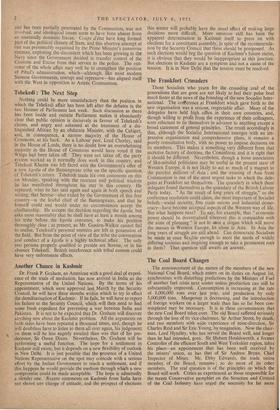Tshekedi : The Next Step
Nothing could be more unsatisfactory than the position in which the Tshekedi affair has been left after the debates in the two Houses of Parliament last week. Such discussion as there has been inside and outside Parliament makes it abundantly clear that public opinion is decisively in favour of Tshekedi's claims, and angry and ashamed at the treatment of a dis- tinguished African by an obdurate Minister, with the Cabinet, and, in consequence, a narrow majority of the House of Commons, at his back. As a Labour peer, Lord Chorley, said in the House of Lords, there is no doubt how an overwhelming majority in the House of Commons would have voted if the Whips had been taken off. They were not taken off, the party system worked as it normally does work in this country, and Tshekedi Khama was left faced with the Government's offer of a new kgotla of the Bamangwato tribe on the specific question. of Tshekedi's return. Tshekedi made his own comments on this on Monday, speaking with the restraint and political wisdom he has manifested throughout his stay in this country. He repeated, what he has said again and again in both speech and Writing, that Seretse—also exiled by the Government of this free country—is the lawful chief of the Bamangwato, and that he himself could and would under no circumstances accept the chieftainship. He accepts the decision regarding the kgotla, but asks most reasonably that he shall have at least a month among his tribe before the kgotla convenes, to make his position thoroughly clear ; at present, as Mr. Gordon-Walker cannot fail to realise, Tshekedi's personal enemies are left in possession of the field. But from the point of view of the tribe the convocation and conduct of a kgotla is a highly technical affair. The only two persons properly qualified to preside are Seretse, or in his absence Tshekedi. British interference with tribal custom could have very unfortunate effects.






















































 Previous page
Previous page